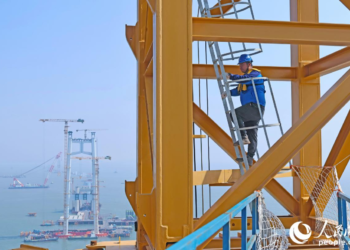Lahore: Sindh province is forefront in the race of receiving major portion out of the $46 billion Chinese investment under China-Pakistan Economic Corridor (CPEC), stated Minister for Planning, Development and Reform Ahsan Iqbal on Sunday.
The minister said out of the $46 billion Chinese investment, $11.5 billion was for Sindh, $7.1 billion for Balochistan while $6.9 billion was allocated for Punjab and government had no discretion in utilising these funds.
He was addressing the participants of the seminar on ‘Different Forms of Economic Corridor Project’ organised by Pakistan Institute of National Affairs (PINA) and University of Management and Technology (UMT). The purpose of the seminar was to examine different aspects of CPEC and its outcomes after completion.
He maintained that reservations of the Khyber Pakhtunkhwa and Balochistan provinces have been resolved during meeting chaired by Prime Minister Nawaz Sharif. Addressing the participants, the minister said that development of the CPEC gateway city of Gawadar, solution to energy crisis in Pakistan, infrastructure development and industrialisation are four main pillars of the economic corridor.
He elaborated that Gawadar city was being developed on modern lines so that it could facilitate the mega trade activities in future, and out of the $46 billion Chinese investment, $35 billion (77 percent) was being spent on energy projects.
Ahsan Iqbal said that road network development was also being focused and all missing links were being constructed and work on all the CPEC routes – western, central and eastern – was underway expeditiously. He said Lahore-Karachi Motorway was not part of the CPEC, however, China was providing concessional financing for its Multan-Sukkur section, he maintained. The CPEC projects would be a game-changer and transform Pakistan into an economic hub for Afghanistan, Central Asian states and China, he remarked.
“We must not spoil this opportunity of CPEC and do not miss this turning point that has the potential to turnaround the country’s economy,” he asserted. He mentioned that in next 10 years, Pakistan would be at a trajectory from where her economy could take-off at a faster pace.
The countries, which made foreign direct investment (FDI) as the basis for development, had excelled in the world and their economies grew at a faster pace, he said and recalled that South Korea was far behind economically as in 1960s, her exports were then $ 60 million against Pakistan’s $ 200 million but today, S Korean export volume swelled to $ 570 billion and Pakistan could increase her exports mere up to $ 25 billion.
Ahsan Iqbal said that two years ago, the western media and global institutions had been terming Pakistan a dangerous state but today the same media and institutions were all praised of Pakistan and declared her as rising economy in the Asia.
On this occasion, Chinese Consul General in Lahore Yu Boren appreciated the organisers of the seminar and assured that China would continue to support for successful completion of the corridor. He said that CPEC was the part of China’s ‘One road-One Belt’ project, adding that due to the CPEC, people of both the friendly countries would be enjoying common development and prosperity. It was a matter of great satisfaction that people from all walks of life were supporting and welcoming this magical project, he said.
Balochishtsn government spokesman Anwarul Haq Kakar, PINA President Altaf Hussain Qureshi, UMT Rector Sohaib Hassan Murad also spoke on the occasion.


















